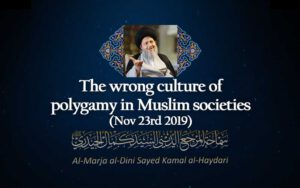839 words, approximate reading time 7 minutes
1. The issue of Lʻan is a Qurʾanic issue and there is no need to prove it further by Hadith. The scholars also prove it using the Qurʾanic arguments although certain Hadīth have been quoted from the Prophet and Imams regarding the issue whose authenticity need to studied separately, one by one.
2. As other laws of Islam, Lʻan also becomes impermissible and a secondary ruling in case there is a greater vice in performing it, for example, Takfīr, murder and danger to the sect or harassment of its followers.
3. Lʻan and Tabarri are not synonymous terms, instead, their relationship is that of intention and extension i.e. Lʻan is one of the most prominent extensions and expressions of Tabarri.
4. Determining the extensions and forms of expression of Tabarri is dependent on the circumstances (time and place) whereas Tabarri itself remains constant irrespective of the situation even though its extensions keep changing.
5. Different forms of Tabarri should be used depending on the circumstances and one should not confine himself to just one of them. Tabarri may take the form of Lʻan, war or scholarly debates etc. (which are all extensions) depending on the situation. Therefore, Barā’ah itself is one thing and expressing it using different extensions and forms of it in different situations is something else, yet, unfortunately a lot of scholars and people keep mixing the two.
6. Abuse and using swearwords are in no means an extension of Barā’ah. Those who use vulgar words against their enemies in the name of Tabarri, not only do not benefit from the reward of Tabarri but in fact are committing a sinful act that is against Islamic rulings, ethics and teachings.
7. If Lʻan results in discord between Muslims and weakening of the Islamic Ummah, not only is it not recommended but is in fact forbidden as Qurʾan states Islamic unity as one of the most important principles. “And hold firmly to the rope of Allah all together and do not become divided.” (Surah Āle ʿmrān; 103). Upholding the principles of Tabarri is what is important, and not a particular form of it as Tabarri can take various forms and be expressed through various extensions depending of the circumstances.
8. The ruling for prohibition of Lʻan is applicable even for times when there is a probability of disorder; not to speak of times when there is a reasonable danger or surety of its occurrence.
9. Prohibition of Lʻan, is not based on Taqiyyah (al-Ḥukm al-Thanawiyya or secondary laws- laws), instead according to us, it is a general rule where the time and place considerations have to be considered. Lʻan is permissible at a particular place and time and totally impermissible at a particular place and time. Therefore, its permissibility at a particular time does not imply that it is permissible at all times and the same way, its permissibility at a particular place does not imply its permissibility at all places. Therefore, generalization and implication of all extensions of Tabari without taking time and place into consideration is incorrect.
10: The Ziyarah mentioned in the book Mafatih al-Jinān under the name of Ziyarat ʿAshura contains the Ziyarah itself and three paragraphs following it. The Ziyarah starts as follows,
«اَلسَّلامُ عَلَیْکَ یا اَباعَبْدِاللَّهِ اَلسَّلامُ عَلَیْکَ یَابْنَ رَسُولِ اللَّهِ»
till the phrase
وَ بِالْمُوالاتِ لِنَبِیِّکَ وَ آلِ نَبِیِّکَ عَلَیْهِ وَ عَلَیْهِمُ اَلسَّلامُ
Which is followed by the three paragraphs. The first one starts as:
اَللّهُمَّ الْعَنْ اَوَّلَ ظالِمٍ ظَلَمَ حَقَّ مُحَمَّدٍ وَ آلِ مُحَمَّدٍ…
The second one as follows:
اَلسَّلامُ عَلَیْکَ یا اَباعَبْدِاللَّهِ وَ عَلَى الاَْرْواحِ الَّتى حَلَّتْ بِفِناَّئِکَ…
The third one starts as:
اَللّهُمَّ خُصَّ اَنْتَ اَوَّلَ ظالِمٍ بِاللَّعْنِ مِنّى وَ ابْدَاءْ بِهِ اَوَّلاً ثُمَّ الثّانِىَ وَالثّالِثَ وَ الرّابِعَ
Neither the Ziyarah itself has a problem, nor the Lʻan present in the phrase,
اَللّهُمَّ الْعَنْ اَوَّلَ ظالِمٍ ظَلَمَ حَقَّ مُحَمَّدٍ وَ آلِ مُحَمَّدٍ…
Nor the salutation in the phrase,
اَلسَّلامُ عَلَیْکَ یا اَباعَبْدِاللَّهِ وَ عَلَى الاَْرْواحِ الَّتى حَلَّتْ بِفِناَّئِکَ.
Instead the problem, both in the chain of narrators and the text itself- is present in the third paragraph i.e.
(«اَللّهُمَّ خُصَّ اَنْتَ اَوَّلَ ظالِمٍ بِاللَّعْنِ مِنّى وَ ابْدَاءْ بِهِ اَوَّلاً ثُمَّ الثّانِىَ وَالثّالِثَ وَ الرّابِعَ…
But the Ziyarah itself and the first two following paragraphs- even if we consider that its chain of narrators is weak; which is not so- is not problematic according to the rule of Tafqīr al-Naṣ (paraphrasing a text- separating various phrases of a single Hadith and studying each one of them separately). Each paragraph and phrase of the Ziyarah has authentic signs that authenticate its content and we have discussed this under Tafqīr al-Naṣ.



